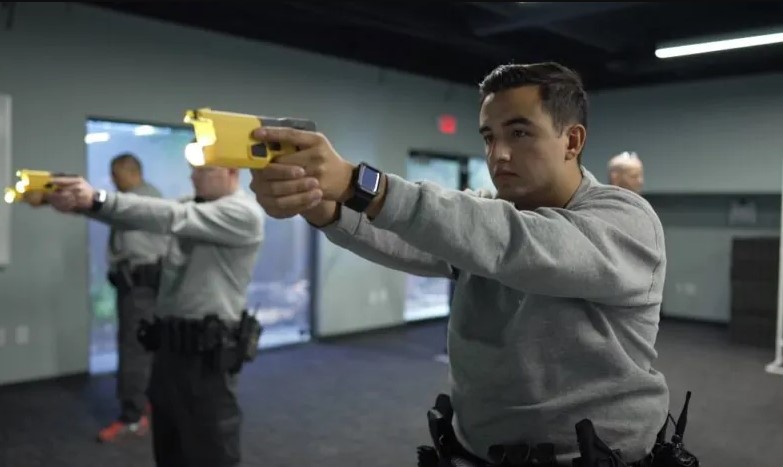In California, the possession and use of tasers and stun guns are primarily governed by Penal Code § 22610 PC. This statute outlines the legal framework for individuals seeking to own or carry these devices for self-defense purposes. While the law permits the general public to utilize tasers for personal protection, there are specific restrictions and conditions that must be adhered to in order to remain compliant with state regulations. Follow: self-defensetools.com!
Legal Definition of Tasers and Stun Guns
Under California law, tasers and stun guns are categorized as “less-lethal” weapons designed to incapacitate individuals temporarily through the application of electric shock. A stun gun typically requires direct contact with the target to deliver an electric charge, whereas a taser can project electrified darts from a distance, allowing the user to subdue an assailant without close physical proximity. Despite these functional differences, both devices are treated similarly under state law.
Who Is Permitted to Own and Use Tasers in California?
The state of California allows most adults to purchase, possess, and carry tasers and stun guns for lawful self-defense. However, there are specific categories of individuals who are prohibited from owning or using these devices:
- Convicted Felons: Individuals who have been convicted of a felony offense are barred from possessing or using tasers.
- Individuals Convicted of Assault: Those who have been found guilty of crimes involving assault are prohibited from owning or using stun guns or tasers.
- Persons with Prior Convictions for Misuse of a Stun Gun: Anyone previously convicted under Section 244.5 for the misuse of a stun gun is not allowed to purchase, possess, or use these devices.
- Narcotics Addicts: Individuals who are addicted to narcotic drugs are prohibited from owning or using tasers.
- Minors: Persons under the age of 16 are not permitted to possess stun guns or tasers. Those aged 16 or 17 may do so only with the written consent of a parent or legal guardian.
Penalties for Unlawful Possession or Use
Violations of Penal Code § 22610 PC can result in legal consequences, which vary depending on the nature of the offense:
- Unlawful Possession: Individuals prohibited from owning tasers who are found in possession of such devices may face misdemeanor charges, punishable by up to six months in county jail and/or fines up to $1,000.
- Unlawful Use: Using a taser in an unlawful manner, such as in the commission of a crime or outside the bounds of self-defense, can lead to more severe charges, including assault with a stun gun under Penal Code § 244.5 PC. Convictions under this statute can result in imprisonment and substantial fines.
Restrictions on Carrying Tasers in Specific Locations
Even for individuals legally permitted to own tasers, there are certain places where carrying these devices is prohibited:
- Government Buildings: Carrying a taser in state or local government buildings is generally prohibited.
- Public Meetings: Possession of a taser is not allowed in meetings that are legally required to be open to the public.
- Schools: Bringing a taser onto school property is forbidden.
- Airports and Passenger Terminals: Tasers are not permitted beyond TSA checkpoints in airports or in secured areas of passenger terminals in ports or harbor facilities.
Concealed Carry of Tasers
Unlike firearms, tasers and stun guns are not classified as firearms under California law. Therefore, individuals are allowed to carry them concealed without the need for a concealed carry permit.
Legal Use of Tasers
The use of a taser is legally justified only in situations of lawful self-defense. Using a taser offensively, without a legitimate threat, can result in criminal charges. Assaulting another person with a stun gun or taser, outside of self-defense, is a punishable offense under California law.

Legal Defenses Against Taser-Related Charges
If an individual is charged with unlawful possession or use of a taser, several legal defenses may be applicable:
- Lack of Prior Convictions: Demonstrating that the individual does not have any prior felony or assault convictions.
- No Possession: Arguing that the individual did not actually possess the taser in question.
- Illegal Search and Seizure: Challenging the evidence on the grounds that it was obtained through unlawful search and seizure procedures.
Conclusion
In summary, while tasers and stun guns are legal for personal self-defense in California, there are specific restrictions and regulations that must be followed. Prohibited individuals, such as convicted felons and narcotics addicts, are not allowed to possess these devices. Additionally, carrying tasers in certain locations and using them outside of self-defense can lead to legal penalties. It is crucial for individuals to understand and comply with these laws to ensure lawful and responsible use of tasers.
Related Posts: Are Tasers Legal in the UK?









